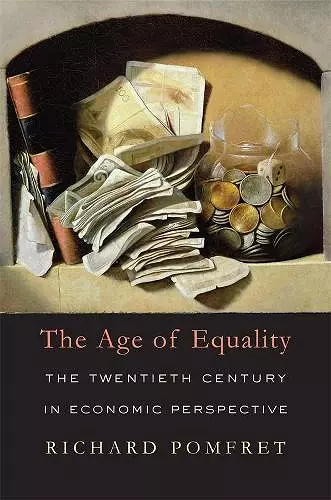The Age of Equality
The Twentieth Century in Economic Perspective
Format:Hardback
Publisher:Harvard University Press
Published:14th Nov '11
Currently unavailable, and unfortunately no date known when it will be back

This book is a great achievement. The twentieth century was filled with different economic experiments and enormous economic and social changes. Pomfret covers the main developments in Western Europe and the United States, with separate chapters on the Soviet economic model, the collapse of central planning, and the developing countries. The book is complete but also succinct, well-informed, and interesting. -- Douglas A. Irwin, Dartmouth College The linking of history and sound economics in telling the story of the last two centuries (the author goes substantially beyond the twentieth-century emphasis of the title) is a terrific idea, and the application of different growth models in explaining twentieth-century growth in various institutional and political contexts is wonderful. The emphasis on equality and inequality is also very welcome and feeds into current and important contemporary concerns: does high inequality, especially in the U.S. and the U.K. jeopardize continued growth? -- Harold James, Princeton University
Alongside unprecedented improvements in longevity and material well-being, the twentieth century saw the rise of fascism and communism and a second world war followed by a cold war. Governments with market economies won the battle against these competing systems by combining growth and efficiency with greater equality of opportunity and outcome.
In 1900 the global average life expectancy at birth was thirty-one years. By 2000 it was sixty-six. Yet, alongside unprecedented improvements in longevity and material well-being, the twentieth century also saw the rise of fascism and communism and a second world war followed by a cold war. This book tells the story of the battles between economic systems that defined the last century and created today's world.
The nineteenth century was a period of rapid economic growth characterized by relatively open markets and more personal liberty, but it also brought great inequality within and between nations. The following century offered sharp challenges to free-wheeling capitalism from both communism and fascism, whose competing visions of planned economic development attracted millions of people buffeted by the economic storms of the 1930s. The Age of Equality describes the ways in which market-oriented economies eventually overcame the threat of these visions and provided a blueprint for reform in nonmarket economies. This was achieved not through unbridled capitalism but by combining the efficiency and growth potential of markets with government policies to promote greater equality of opportunity and outcome. Following on the heels of economic reform, rapid catch-up growth in countries such as China, India, Indonesia, Brazil, and Poland helped to reduce global inequality.
At a time when inequality is on the rise in nations as disparate as the United States and Egypt, Pomfret’s interpretation of how governments of market economies faced the challenges of the twentieth century is both instructive and cautionary.
This book is a great achievement. The twentieth century was filled with different economic experiments and enormous economic and social changes. Pomfret covers the main developments in Western Europe and the United States, with separate chapters on the Soviet economic model, the collapse of central planning, and the developing countries. The book is complete but also succinct, well-informed, and interesting. -- Douglas A. Irwin, Dartmouth College
The linking of history and sound economics in telling the story of the last two centuries (the author goes substantially beyond the twentieth-century emphasis of the title) is a terrific idea, and the application of different growth models in explaining twentieth-century growth in various institutional and political contexts is wonderful. The emphasis on equality and inequality is also very welcome and feeds into current and important contemporary concerns: does high inequality, especially in the U.S. and the U.K. jeopardize continued growth? -- Harold James, Princeton University
This in-depth history examines economic growth over two centuries from a global perspective, outlining relationships between economic perspectives, governmental policymaking, monetary systems, marketplaces, wars, and cyclic events, such as inflations and recessions...Especially interesting is Pomfret's discussion of the history of the gold standard and its relationship to economic growth and equality, which is relevant in light of the current economic climate. -- Caroline Geck * Library Journal *
[An] engaging history of the twentieth century. -- Richard N. Cooper * Foreign Affairs *
ISBN: 9780674062177
Dimensions: unknown
Weight: unknown
296 pages